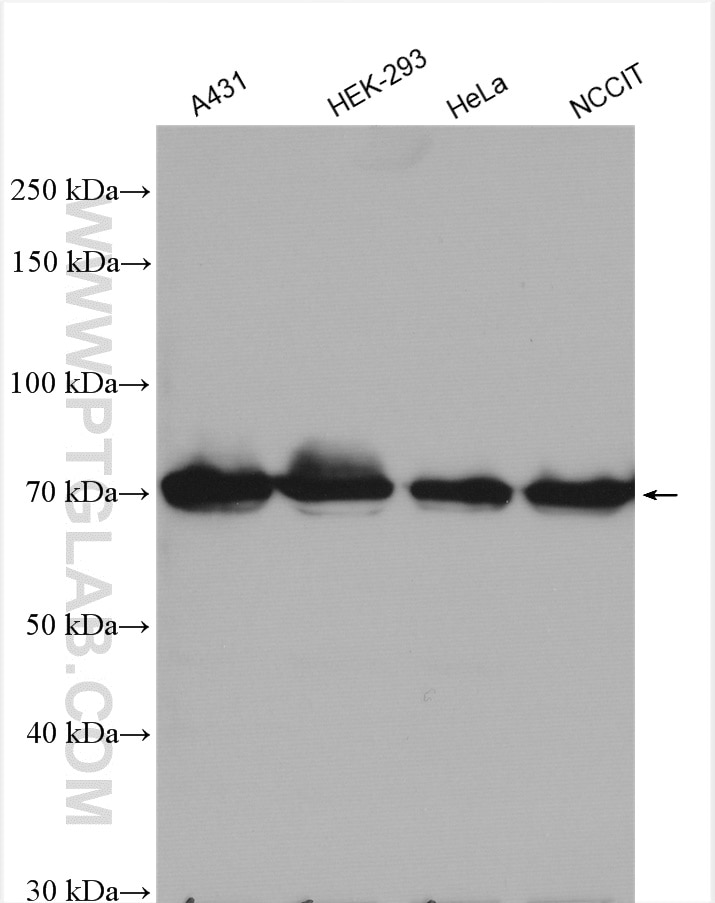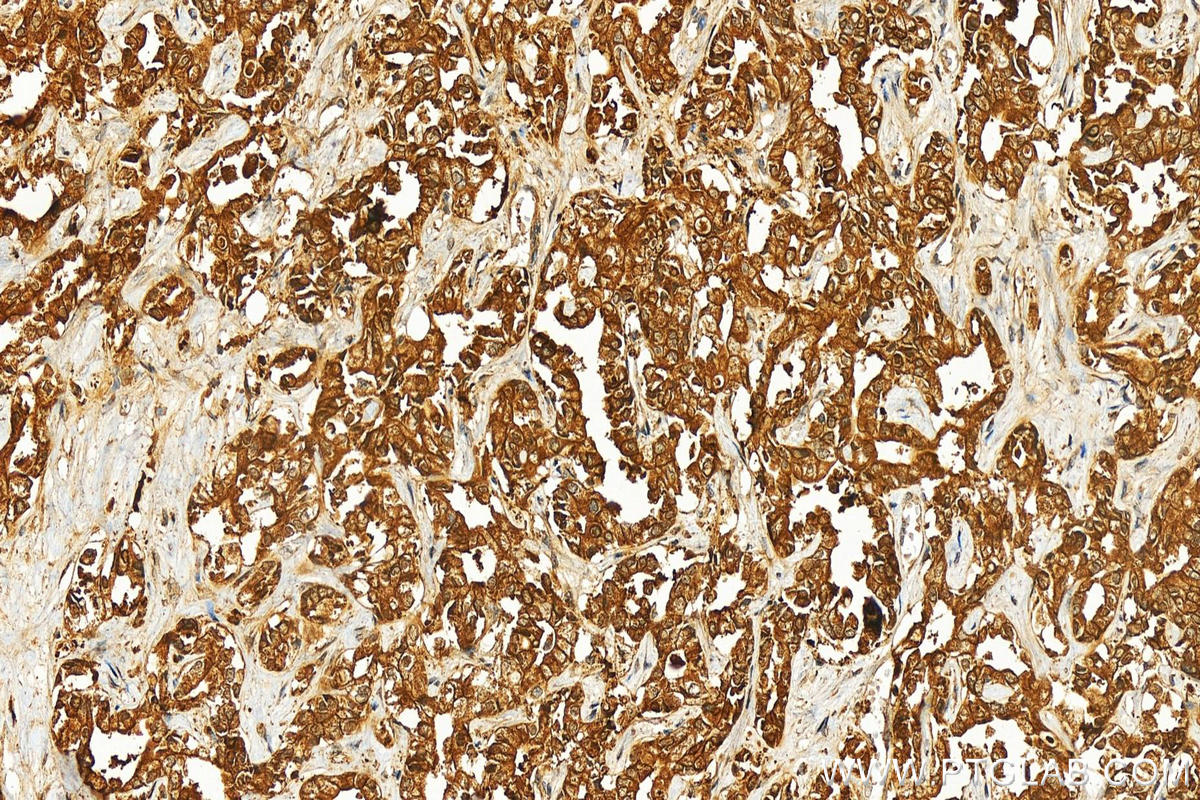FLCN Polyklonaler Antikörper
FLCN Polyklonal Antikörper für WB, IHC, ELISA
Wirt / Isotyp
Kaninchen / IgG
Getestete Reaktivität
human, Maus, Ratte
Anwendung
WB, IHC, IF, IP, ELISA
Konjugation
Unkonjugiert
Kat-Nr. : 11236-2-AP
Synonyme
Geprüfte Anwendungen
| Erfolgreiche Detektion in WB | A431-Zellen, HEK-293-Zellen, HeLa-Zellen, NCCIT-Zellen |
| Erfolgreiche Detektion in IHC | human intrahepatic cholangiocarcinoma tissue Hinweis: Antigendemaskierung mit TE-Puffer pH 9,0 empfohlen. (*) Wahlweise kann die Antigendemaskierung auch mit Citratpuffer pH 6,0 erfolgen. |
Empfohlene Verdünnung
| Anwendung | Verdünnung |
|---|---|
| Western Blot (WB) | WB : 1:500-1:1000 |
| Immunhistochemie (IHC) | IHC : 1:50-1:500 |
| It is recommended that this reagent should be titrated in each testing system to obtain optimal results. | |
| Sample-dependent, check data in validation data gallery | |
Veröffentlichte Anwendungen
| KD/KO | See 2 publications below |
| WB | See 6 publications below |
| IHC | See 2 publications below |
| IF | See 1 publications below |
| IP | See 1 publications below |
Produktinformation
11236-2-AP bindet in WB, IHC, IF, IP, ELISA FLCN und zeigt Reaktivität mit human, Maus, Ratten
| Getestete Reaktivität | human, Maus, Ratte |
| In Publikationen genannte Reaktivität | human, Maus, Ratte |
| Wirt / Isotyp | Kaninchen / IgG |
| Klonalität | Polyklonal |
| Typ | Antikörper |
| Immunogen | FLCN fusion protein Ag1746 |
| Vollständiger Name | folliculin |
| Berechnetes Molekulargewicht | 65 kDa |
| Beobachtetes Molekulargewicht | 64-75 kDa |
| GenBank-Zugangsnummer | BC015687 |
| Gene symbol | FLCN |
| Gene ID (NCBI) | 201163 |
| Konjugation | Unkonjugiert |
| Form | Liquid |
| Reinigungsmethode | Antigen-Affinitätsreinigung |
| Lagerungspuffer | PBS with 0.02% sodium azide and 50% glycerol |
| Lagerungsbedingungen | Bei -20°C lagern. Nach dem Versand ein Jahr lang stabil Aliquotieren ist bei -20oC Lagerung nicht notwendig. 20ul Größen enthalten 0,1% BSA. |
Hintergrundinformationen
FLCN, also named as BHD, belongs to the folliculin family. It may play a role in the pathogenesis of an uncommon form of kidney cancer through its association with an inherited disorder of the hair follicle (fibrofolliculomas). FLCN may be a tumor suppressor. It is involved in colorectal tumorigenesis. It may be involved in energy and/or nutrient sensing through the AMPK and mTOR signaling pathways. Mutation of FLCN may cause the BHD(Birt-Hogg-Dube syndrome ) or (PSP) primary spontaneous pneumothorax. And it may be involved in renal cell carcinoma.
Protokolle
| PRODUKTSPEZIFISCHE PROTOKOLLE | |
|---|---|
| WB protocol for FLCN antibody 11236-2-AP | Protokoll herunterladen |
| IHC protocol for FLCN antibody 11236-2-AP | Protokoll herunterladenl |
| STANDARD-PROTOKOLLE | |
|---|---|
| Klicken Sie hier, um unsere Standardprotokolle anzuzeigen |
Publikationen
| Species | Application | Title |
|---|---|---|
FASEB J AMPK promotes induction of the tumor suppressor FLCN through activation of TFEB independently of mTOR. | ||
DNA Repair (Amst) Activation of AMP-activated protein kinase by MAPO1 and FLCN induces apoptosis triggered by alkylated base mismatch in DNA.
| ||
Front Mol Biosci FLCN Regulates HIF2α Nuclear Import and Proliferation of Clear Cell Renal Cell Carcinoma. | ||
J Trace Elem Med Biol Methionine-chelated Zn promotes anabolism by integrating mTOR signal and autophagy pathway in juvenile yellow catfish. | ||
Biochem Biophys Res Commun Stabilization of MAPO1 by specific binding with folliculin and AMP-activated protein kinase in O?-methylguanine-induced apoptosis.
| ||
Curr Res Neurobiol Propranolol reduces the accumulation of cytotoxic aggregates in C9orf72-ALS/FTD in vitro models |



